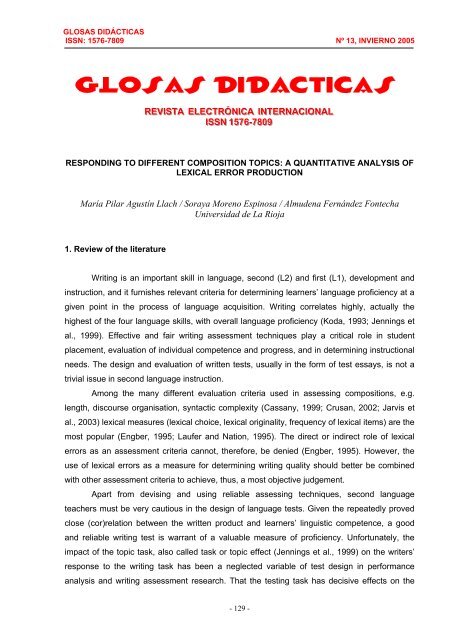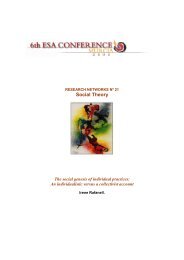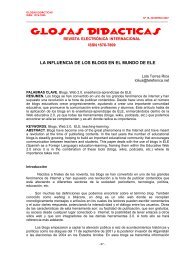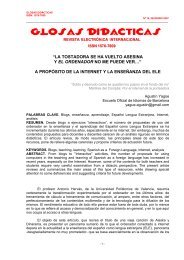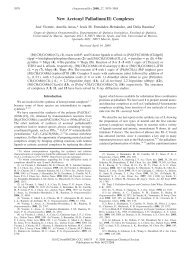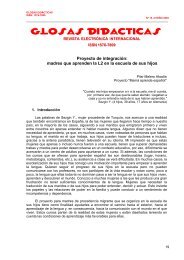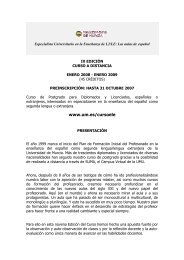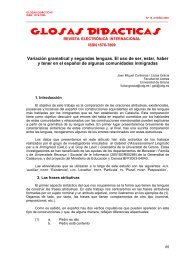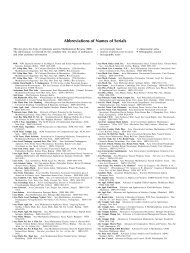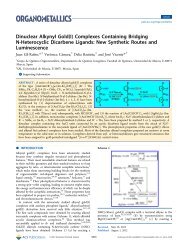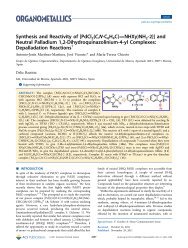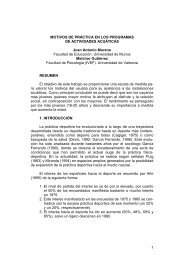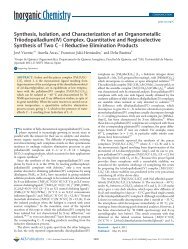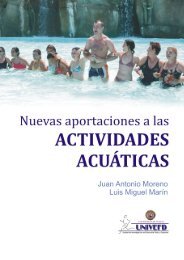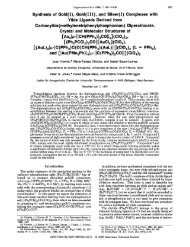descarga del número 13 de glosas didácticas completo
descarga del número 13 de glosas didácticas completo
descarga del número 13 de glosas didácticas completo
Create successful ePaper yourself
Turn your PDF publications into a flip-book with our unique Google optimized e-Paper software.
GLOSAS DIDÁCTICAS<br />
ISSN: 1576-7809 Nº <strong>13</strong>, INVIERNO 2005<br />
REVISTTA ELLECTTRÓNI ICA INTTERNACI<br />
I IONALL<br />
ISSN I 11557766- -77880099<br />
RESPONDING TO DIFFERENT COMPOSITION TOPICS: A QUANTITATIVE ANALYSIS OF<br />
LEXICAL ERROR PRODUCTION<br />
María Pilar Agustín Llach / Soraya Moreno Espinosa / Almu<strong>de</strong>na Fernán<strong>de</strong>z Fontecha<br />
Universidad <strong>de</strong> La Rioja<br />
1. Review of the literature<br />
Writing is an important skill in language, second (L2) and first (L1), <strong>de</strong>velopment and<br />
instruction, and it furnishes relevant criteria for <strong>de</strong>termining learners’ language proficiency at a<br />
given point in the process of language acquisition. Writing correlates highly, actually the<br />
highest of the four language skills, with overall language proficiency (Koda, 1993; Jennings et<br />
al., 1999). Effective and fair writing assessment techniques play a critical role in stu<strong>de</strong>nt<br />
placement, evaluation of individual competence and progress, and in <strong>de</strong>termining instructional<br />
needs. The <strong>de</strong>sign and evaluation of written tests, usually in the form of test essays, is not a<br />
trivial issue in second language instruction.<br />
Among the many different evaluation criteria used in assessing compositions, e.g.<br />
length, discourse organisation, syntactic complexity (Cassany, 1999; Crusan, 2002; Jarvis et<br />
al., 2003) lexical measures (lexical choice, lexical originality, frequency of lexical items) are the<br />
most popular (Engber, 1995; Laufer and Nation, 1995). The direct or indirect role of lexical<br />
errors as an assessment criteria cannot, therefore, be <strong>de</strong>nied (Engber, 1995). However, the<br />
use of lexical errors as a measure for <strong>de</strong>termining writing quality should better be combined<br />
with other assessment criteria to achieve, thus, a most objective judgement.<br />
Apart from <strong>de</strong>vising and using reliable assessing techniques, second language<br />
teachers must be very cautious in the <strong>de</strong>sign of language tests. Given the repeatedly proved<br />
close (cor)relation between the written product and learners’ linguistic competence, a good<br />
and reliable writing test is warrant of a valuable measure of proficiency. Unfortunately, the<br />
impact of the topic task, also called task or topic effect (Jennings et al., 1999) on the writers’<br />
response to the writing task has been a neglected variable of test <strong>de</strong>sign in performance<br />
analysis and writing assessment research. That the testing task has <strong>de</strong>cisive effects on the<br />
- 129 -


